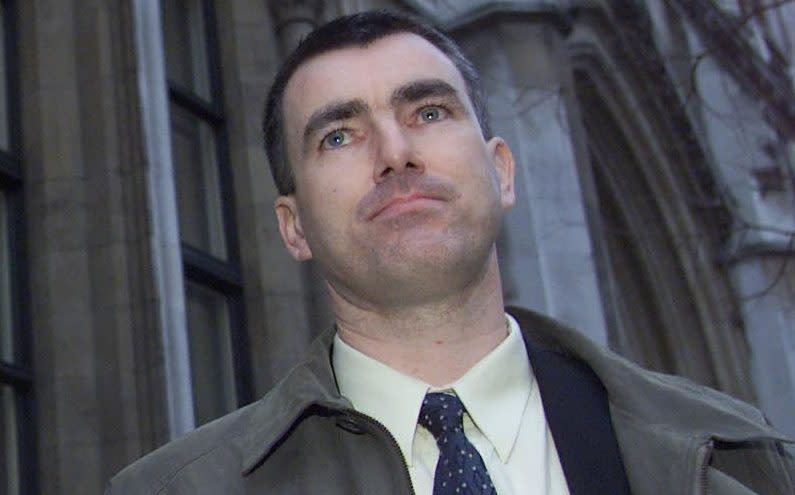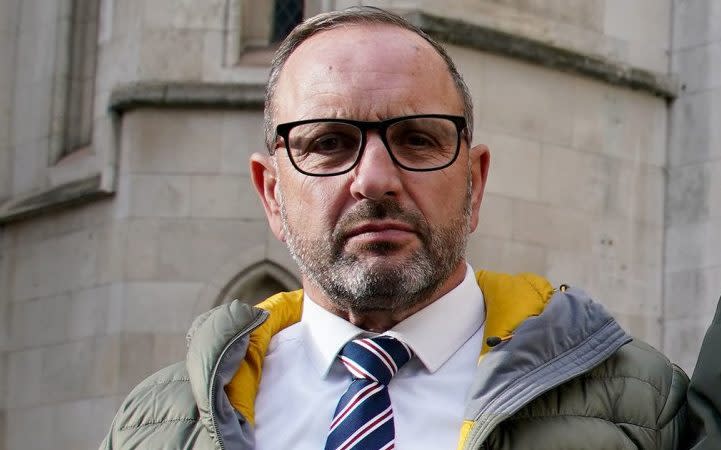Starmer tried to win damages for convicted IRA terrorist

- Oops!Something went wrong.Please try again later.
Sir Keir Starmer tried to win damages for a convicted IRA terrorist and an armed robber who took part in a violent breakout from a maximum security prison.
He went to the High Court in a bid to win compensation for the men over their treatment by prison guards when they were recaptured after escaping from Whitemoor Prison, in Cambridgeshire, in 1994.
The legal case, mounted in 2001, also included a third man, Danny McNamee, whose conviction for playing a part in the 1982 Hyde Park bombing had been quashed in December 1998 on new evidence. It led to two of the men receiving several thousands of pounds each, amid concern over the cost of proceedings to the taxpayer.
Sir Keir, now the Labour leader and favourite to win the next election, succeeded in winning aggravated damages of £5,000 for McNamee.
Then a lawyer in private practice, went on to become Director of Public Prosecutions, running the Crown Prosecution Service, from 2008 until 2013.
He also won £2,500 for Andrew Russel, a convicted armed robber, after arguing that prison officers had hit and kicked him when he was recaptured.
Sir Keir’s bid to win damages for Liam McCotter, a convicted IRA bomber, on the grounds that unreasonable force had been used when he was handcuffed, failed.
McCotter, who was seeking compensation of £50,000, had been jailed for 15 years in June 1988 for conspiracy to cause explosions in Manchester and London after a 200lb cache of Semtex was found.
The men’s case, funded by legal aid, reportedly cost taxpayers £500,000, causing disquiet when the figure was contrasted to the £14,000 compensation received by a prison officer wounded in the breakout.
McNamee, McCotter and Russell were part of a six-strong gang who took part in the breakout, during which John Kettleborough, the prison officer, was shot and wounded.

The escapers were arrested within minutes and the three claimed they had been punched, kicked or beaten with batons by prison officers as they were taken back to the segregation unit.
Home Office officials said that all the injuries were escape-related, but Sir Keir argued that what happened to his three clients after they were caught amounted to “inhuman or degrading treatment or punishment”.
In a three-hour judgment in the High Court in March 2001, Mr Justice Crane accepted the claims of McNamee and Russell but found the use of handcuffs on McCotter was reasonable force.
He said that the second blow from a stave received by McNamee was “a gratuitous piece of punishment inflicted after he was effectively restrained” and that so were most of the blows and kicks he suffered.
Mr Justice Crane said that while Russell’s injuries were less serious than McNamee’s, “the assault on him when he was effectively restrained on the ground included at least one kick to the face”, adding: “That again was a gratuitous piece of punishment”.
However, the judge rejected Sir Keir’s bid for his clients to receive higher, exemplary damages.
Sir Keir and his legal team conceded that, by taking part in an escape, the men had voluntarily exposed themselves to the risk of injury, but Mr Justice Crane went further in his ruling.
“The officers had been frightened by the actions of the escapers in carrying and using firearms. They were angered because a colleague had been shot and injured,” he said. “The actions of the claimants had undoubtedly contributed to the heated atmosphere in which they were recaptured and in that sense to their injuries.”
‘Those who break the law do not forfeit its protection’
Mr Justice Crane addressed public criticism of the men’s civil action and its cost to the taxpayer, saying: “Some people may take the view that if a group of armed prisoners escape from a prison, they should not be entitled to complain about any violence to them in the course of their recapture.
“However, the duty of the court is clear – to ascertain the facts and to judge the issues that arise. Those who break the law do not forfeit its protection.”
As well as the two smuggled guns used in the carefully planned Whitemoor escape, a kilogram of Semtex was also found in the grounds of the prison. The escapers had an array of equipment, including wire cutters and a 17ft rope ladder, which they had been able to make in the prison’s workshops.
The breakout was described in an official report by Sir John Woodcock, the chief inspector of constabulary, as “a disaster waiting to happen”, with poor management at every level of the prison service, including Home Office ministers.
It led to a bitter public row between Michael Howard, the then home secretary, and Derek Lewis, the then head of the prison service, about who was to blame.
McNamee was convicted in 1986 after his fingerprint was found on electronic circuits in an arms cache linked to the Hyde Park bombing. His conviction was overturned in December 1998 after more prominent fingerprints belonging to a known IRA bomb-maker were found on the same circuits.
Despite quashing McNamee’s conviction, the appeal judges stated: “The Crown makes a strong case that the appellant [McNamee] was guilty of a conspiracy to cause explosions.”
The brother of Simon Tipper, one of the four soldiers killed in the Hyde Park bombing, criticised Sir Keir Starmer’s legal fight to obtain compensation for McNamee after his prison escape.
Mark Tipper, 64, told The Telegraph: “Starmer helped this man get £5,000 of taxpayers’ money, but has he ever thought of the Hyde Park bomb families and what we went through? Is there anyone in Westminster who cares about victims? Money wouldn’t compensate for my brother’s death, but we have never been offered anything.”

Sir Keir’s supporters point out that, under the “cab rank” rule, barristers must take cases on when asked to do so to prevent them discriminating against clients.
His spokesman said he had acted in the final hearing for Richards, having taken on the case from a colleague.
“Keir Starmer was the country’s most senior prosecutor, serving under Labour and Tory governments. During this time, he oversaw the first-ever prosecution of al-Qaida terrorists, the jailing of the airline liquid bomb plotters and the racist murderers of Stephen Lawrence,” the spokesman added.
“With his leadership, charge and conviction rates for sexual offences rose, victims were better supported and the Crown Prosecution Service was positively reformed.
“Of course, as a lawyer he has had to represent people whose views he doesn’t agree with – that’s what the job of a lawyer involves. These are simply desperate attacks from a Tory party that has given up on running the country.”
Starmer tried to win damages for man who murdered officer
Sir Keir also tried to win damages for an armed robber who murdered a police officer, claiming his human rights had been breached.
Colin Richards was jailed for life in July 1985 for murdering Pc Brian Bishop with a sawn-off shotgun after ignoring police warnings to give himself up.
Sir Keir argued in the High Court that Richards was entitled to damages for “wrongful detention” after his release from prison had been delayed.
Richards, who was paralysed and left in a wheelchair as a result of injuries sustained in a gun battle with police, sued the Home Office. He had demanded compensation, claiming he had been wrongfully detained for nine months after the Parole Board had recommended his release.
The Home Office delayed his release until August 2002, having been unable to find him a suitable bail hostel because of his injuries.
A High Court judge threw out the claim, insisting “no loss” had been incurred “because of the claimant’s severe disabilities”, which meant it was difficult to find suitable accommodation, while also noting Richards’ “previous misbehaviour” while on licence.
Using European human rights law, Sir Keir argued in the High Court that his client was “entitled to damages for wrongful detention because the defendant [Home Office] failed to comply with the duty imposed on him by Article 5(5) of the European Charter of Human Rights when he refused to make any payment to [Richards] in respect of his wrongful detention”.
Critics have said the actions of lawyers in seeking damages for a murderer such as Richards served to undermine the support that police officers deserved from the criminal justice system.

Priti Patel, the former home secretary, said: “This case is a tragic and sobering reminder of the dangers and sacrifices our front line officers make to protect the public as they serve their community and country.
“The public are rightly sickened by the actions of lawyers who use aspects of the human rights convention and laws to defend and protect murderers, as happened in this case with Keir Starmer acting as defence lawyer for this criminal.
“The public will be alarmed by his record to defend this murderer, and the fact the court threw this case out illustrates serious concerns about his commitment to protect the public and whether the Labour Party are committed to the principles of law and order.”
She questioned the suitability of Sir Keir to be the next prime minister, accusing him of being “soft on crime”.
Geraldine Winner, who chairs the Police Memorial Trust, said: “The men and women of the British police service do a job that is inherently dangerous. We must do all we can to protect our brave police officers.
“When an officer is murdered doing their duty, their loved ones, colleagues and indeed the public have a right to expect that the offender will be punished and go to prison for a very long time.”
Following the murder of Pc Bishop, Mrs Winner’s late husband Michael, the film director who founded the Police Memorial Trust, erected a memorial in his honour in Frinton-on-Sea.
Norwich Crown Court had heard that Pc Bishop, aged 37, was among eight armed officers who had been sent to arrest Richards, then 35, near Frinton seafront in August 1984, several hours after he had carried out armed raids at Walton-on-the-Naze and Frinton post offices.
The officers lay in wait for Richards to return to collect a bag containing the stolen cash, which he had dumped in nearby bushes.
Richards at first ignored warnings before opening fire with a sawn-off shotgun. Pc Bishop, married with one son, died five days later from head wounds, and Sgt Mervyn Fairweather, a colleague, was wounded. Pc Brian Waugh returned fire and Richards was left permanently paralysed from the waist down.
Sentencing Richards to life for the murder of Pc Bishop, Mr Justice Boreham set a minimum tariff of 17 years rather than 20, after taking into account the serious injuries he had sustained.
When the minimum tariff expired on Sept 19 2001, the Parole Board recommended Richards should be released on Nov 16 that year. But he was not let out by David Blunkett, the then Labour home secretary, until Aug 12, nine months later. Mr Blunkett subsequently turned down Richards’ claim for compensation for wrongful detention.
Richards took the case to the High Court, where Sir Keir argued that he was entitled to compensation because he should have been released within 21 days of the Parole Board’s decision.
The Home Office argued that Richards had been released within a reasonable period and that as a result his detention “never became unlawful”. The court rejected Richards’ claim for damages.
‘I am unable to agree with Mr Starmer’
The Honourable Mr Justice Silber ruled that Richards’ final release was delayed because he had previously breached his conditions while released on temporary licence earlier in 2001 and because there were no suitable hostel places available for him as a paraplegic.
In his judgment, he stated: “I am unable to agree with Mr Starmer that the fact that the claimant was placed in an open prison indicates that he would not have been recalled to prison.
“The reasons why he would not have been released related not to the fact that he would abscond and/or commit serious offences but the fact that with his disabilities and his history of alcohol abuse, he needed to be placed in a suitable hostel in circumstances in which he would not abuse alcohol.”
The judge concluded that Richards was not entitled compensation in part because “he was responsible for some substantial periods of the delay in finding him suitable accommodation”.
Pc Bishop had joined Essex Constabulary as a 15-year-old cadet in 1962 before joining the dog section as a handler. In 1975, he moved to the Force Support Unit and later became a firearms instructor.
He died at St Bartholomew’s Hospital in London, five days after suffering extensive head injuries in the Frinton shooting.
His son David, who was 10 when his father was killed, went on to follow in his footsteps, joining Essex police in 2001. He declined to comment about Sir Keir representing his father’s killer in a claim for compensation.

